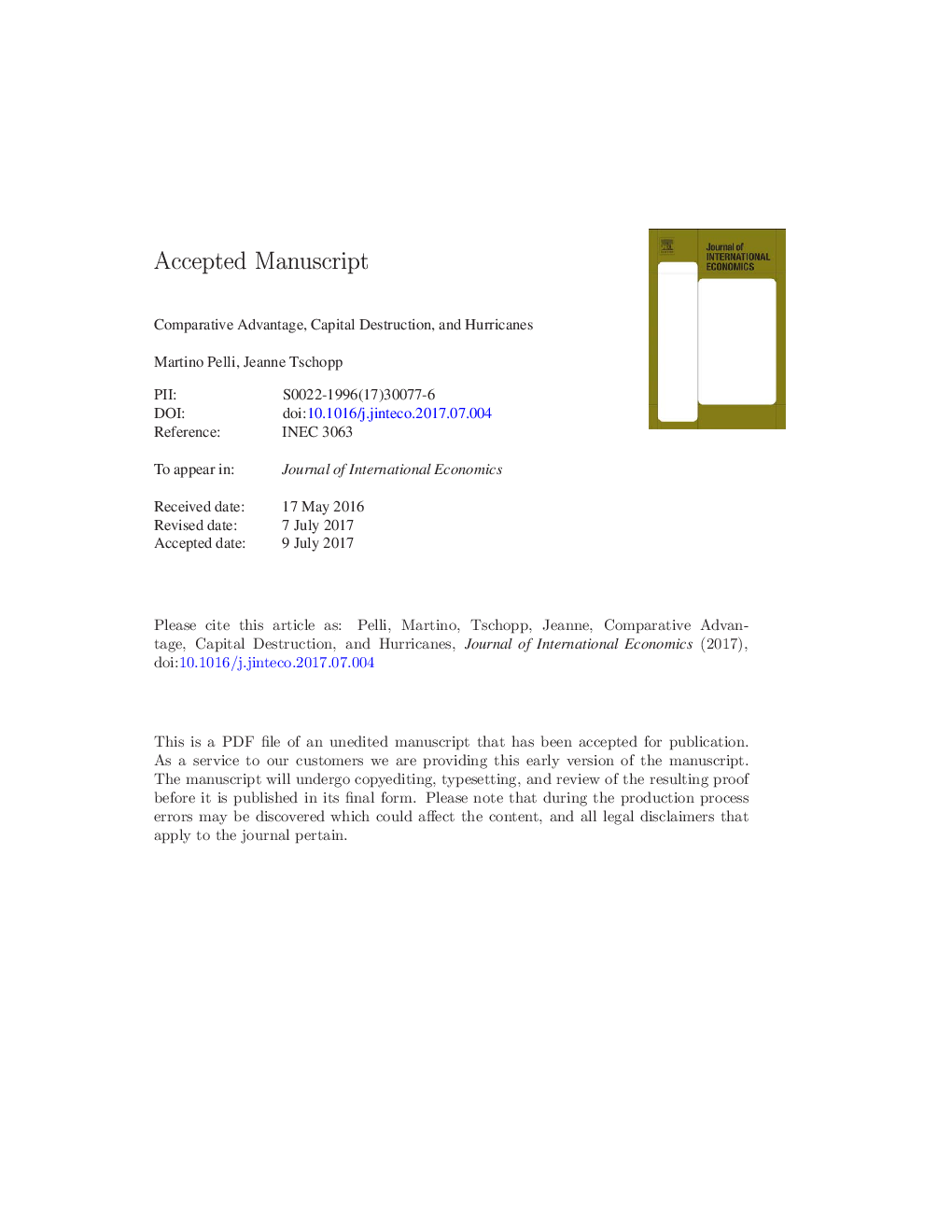| کد مقاله | کد نشریه | سال انتشار | مقاله انگلیسی | نسخه تمام متن |
|---|---|---|---|---|
| 5100909 | 1479076 | 2017 | 72 صفحه PDF | دانلود رایگان |
عنوان انگلیسی مقاله ISI
Comparative advantage, capital destruction, and hurricanes
ترجمه فارسی عنوان
مزیت نسبی، تخریب سرمایه و طوفان
دانلود مقاله + سفارش ترجمه
دانلود مقاله ISI انگلیسی
رایگان برای ایرانیان
کلمات کلیدی
ترجمه چکیده
مزیت نسبی کشورها در طول زمان، با وجودی که شرکت ها ساختار تولید خود را با این تکرار سازگار نمی کنند. این سازگاری آهسته ممکن است به علت هزینه های تنظیم بالا مانند موارد مرتبط با دفع سرمایه فیزیکی موجود باشد. در عمل، این هزینه ها ممکن است توضیح دهند چرا ما متوجه می شویم که کشورها صادرات کالا را در هر دو انتهای طیف مزیت نسبی دارند. در این مقاله، بررسی می شود که چه اتفاقی می افتد اگر هزینه ی تنظیم پویایی مزیت نسبی به طور غیر منتظره کاهش یابد. ما از طوفان ها استفاده می کنیم تا بررسی کنیم که آیا شوک بیرونی منفی به سرمایه فیزیکی شرکت منجر به تغییر مجدد صادرات به صنایع مزیت نسبی می شود. با استفاده از یک پنل 46 کشور و صنایع 4 رقمی در طول دوره 1980-2000، ما نشان می دهیم که اثر طوفان بر صادرات به طور یکنواخت در مزایای نسبی افزایش می یابد. به ویژه، کاهش صادرات برای صنایع با مزیت نسبی کم و رشد برای صنایع با مزیت نسبی بالا است. نتایج ما نیز نشان می دهد که روند انتقال منابع به صنایع مزیت نسبی بالاتر در سه سال پس از شوک افزایش می یابد. این یافته ها نشان می دهد که اگر هزینه فرصت تنظیم کاهش یابد، شرکت ها تمایل دارند که بهتر از قبل کار کنند و طیف مزیت نسبی را افزایش دهند.
موضوعات مرتبط
علوم انسانی و اجتماعی
اقتصاد، اقتصادسنجی و امور مالی
اقتصاد و اقتصادسنجی
چکیده انگلیسی
The comparative advantage of countries evolves over time, yet firms do not continuously adapt their production structure to this evolution. This slow adaptation may be due to high adjustment costs, such as those associated with the disposal of existing physical capital. In practice, these costs may explain why we observe that countries export goods at both ends of the comparative advantage spectrum. This article investigates what happens if the cost of adjusting to the dynamics of comparative advantage is unexpectedly reduced. We use hurricanes to evaluate whether a negative exogenous shock to firms' physical capital leads to a reorganization of exports towards comparative advantage industries. Using a panel of 46 countries and 4-digit industries over the period 1980-2000, we show that the effect of hurricanes on exports is monotonically increasing in comparative advantage. Specifically, export levels drop for industries with a low comparative advantage and grow for industries with a high comparative advantage. Our results also indicate that the process of shifting resources towards higher comparative advantage industries intensifies within the three years following the shock. These findings suggest that if the opportunity cost of adjustment decreases, firms tend to build back better and move up the spectrum of comparative advantage.
ناشر
Database: Elsevier - ScienceDirect (ساینس دایرکت)
Journal: Journal of International Economics - Volume 108, September 2017, Pages 315-337
Journal: Journal of International Economics - Volume 108, September 2017, Pages 315-337
نویسندگان
Martino Pelli, Jeanne Tschopp,
